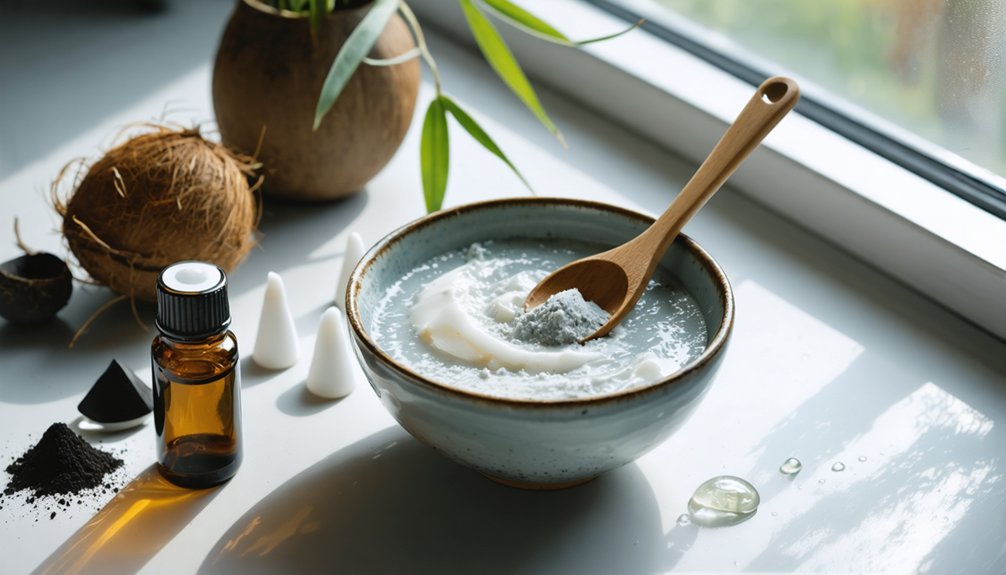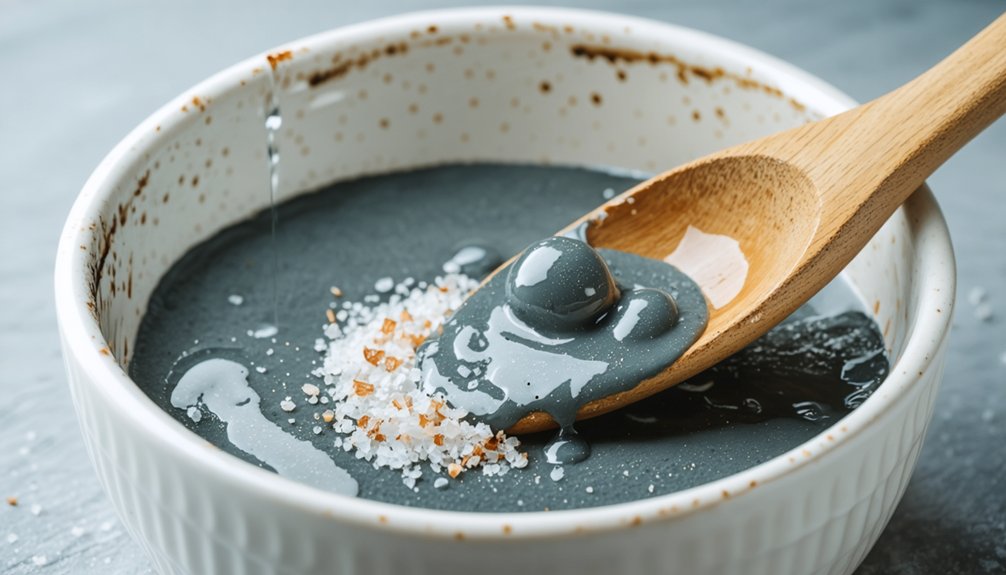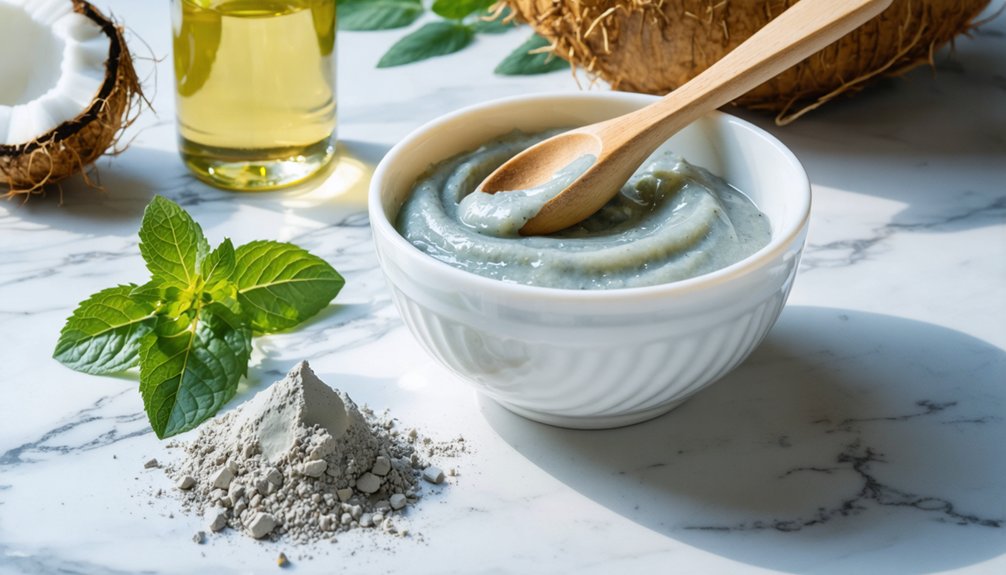You’ll get ideal teeth whitening results by mixing 2 tablespoons of food-grade bentonite clay with 1 tablespoon each of coconut oil and filtered water. Add 1/2 teaspoon of xylitol for taste and antibacterial benefits, plus 2-3 drops of peppermint essential oil. Use only non-metal utensils and store in a glass container. Apply this paste 2-3 times weekly, letting it sit for 2-3 minutes. Our detailed guide explores essential safety tips and proven techniques for maximum effectiveness.
Key Takeaways
- Mix 2 tablespoons bentonite clay, 1 tablespoon baking soda, 1 tablespoon coconut oil, and 5 drops peppermint essential oil.
- Avoid metal utensils when mixing ingredients; use glass, ceramic, or wooden tools to prevent clay deactivation.
- Add filtered water gradually until reaching a smooth, toothpaste-like consistency that spreads easily on teeth.
- Include 1 teaspoon xylitol for sweetness and cavity prevention while maintaining the paste’s natural whitening properties.
- Store in an airtight glass container away from light and heat, using within 2-3 months for best results.
Understanding Bentonite Clay’s Natural Whitening Power
A powerhouse of natural detoxification, bentonite clay works through multiple mechanisms to achieve its whitening effects. When you apply this remarkable substance to your teeth, its negatively charged particles actively bind to toxins, bacteria, and stains, lifting them away from your enamel surface.
One of the key bentonite benefits lies in its unique ability to expand when wet, creating a gentle yet effective polishing action. However, since limited evidence exists regarding its effectiveness for dental care, it’s important to consult a dental professional before starting any new oral care regimen.
As you use clay applications in your oral care routine, you’ll notice it works as a mild abrasive that removes surface stains without damaging your enamel. The clay’s natural mineral content simultaneously supports remineralization while its alkalizing properties help maintain ideal oral pH. The presence of beneficial minerals like silica, calcium, and magnesium helps strengthen tooth structure over time.
This combination of physical cleaning and chemical balancing creates an environment where your teeth can naturally become brighter and healthier.
Essential Ingredients for Your Homemade Paste
Creating an effective bentonite clay teeth whitening paste requires carefully selected ingredients that work synergistically to achieve excellent results.
A well-formulated bentonite clay teeth whitening paste combines key ingredients that work together to deliver superior whitening performance.
You’ll need bentonite clay as your mineral-rich base, combined with gentle abrasives like baking soda or activated charcoal for enhanced stain removal. Add coconut oil to bind the ingredients and provide antimicrobial benefits. The zero waste approach ensures an environmentally-friendly alternative to traditional plastic-packaged toothpaste.
For optimal texture and therapeutic effects, include natural sweeteners like xylitol, which helps combat cavity-causing bacteria. Essential oils such as peppermint or tea tree offer both flavor and antimicrobial properties. Regular use of this paste supports tooth remineralization through the steady exchange of minerals with your enamel.
Consider incorporating remineralizing agents like calcium phosphate compounds to strengthen enamel. Store your mixture in glass or ceramic containers to maintain the clay’s effectiveness, and use non-metal utensils during preparation to prevent unwanted reactions with the bentonite clay.
Step-by-Step Recipe Instructions
When preparing your bentonite clay teeth whitening paste, you’ll need to start by gathering all equipment and ingredients in a clean workspace. Use only non-metal bowls and utensils to maintain the clay’s effectiveness. The clay’s natural binding properties help remove plaque and tartar effectively. Some users report improved mouth health when using homemade tooth powder recipes.
Begin by combining your dry ingredients in a glass or ceramic bowl. Create a well in the center for your liquids. Gradually incorporate melted coconut oil and essential oils, stirring with a wooden spoon or silicone spatula until uniform.
For recipe variations, you can substitute coconut oil with sesame oil, or add activated charcoal for extra whitening power. Adjust the consistency by adding water slowly until you achieve a smooth, spreadable paste.
For ingredient substitutions, consider using xylitol or stevia instead of traditional sweeteners. Store your finished paste in an airtight glass container away from light and heat.
Proven Benefits of Natural Teeth Whitening
While natural teeth whitening methods have gained popularity as alternatives to professional treatments, scientific evidence supporting their effectiveness remains limited.
Natural alternatives like bentonite clay and activated charcoal show potential for removing surface stains, though their whitening capabilities aren’t extensively proven. Overuse of these methods can lead to enamel damage. You’ll find the most significant dietary impact comes from maintaining a balanced diet rich in calcium and fiber while avoiding staining substances like coffee and red wine.
Professional treatments utilize peroxide-based compounds to effectively address both extrinsic and intrinsic staining under controlled conditions. Professional treatments offer more predictable results under expert supervision, but natural methods can be cost-effective additions to your oral care routine.
When considering natural whitening options, you’ll want to focus on proven preventive strategies: regular brushing and flossing, eating crunchy fruits that naturally scrub teeth, and stimulating saliva production through sugar-free gum.
Always consult your dentist before starting any whitening regimen.
Safety Considerations and Precautions
Before using bentonite clay for teeth whitening, you’ll need to guarantee you’re using food-grade clay from a reputable source that tests for heavy metal contamination, particularly lead and mercury.
You should limit applications to 2-3 times weekly to prevent potential enamel erosion and gum sensitivity from the clay’s mild abrasive properties. Using a clean, stainless steel spatula for scooping will help maintain the clay’s adsorptive properties.
If you experience any tooth sensitivity or gum irritation, discontinue use immediately and consult your dentist, as improper use can lead to long-term dental damage. The FDA issued warnings about elevated lead levels in bentonite clay products, making safety verification crucial before use.
Essential Safety Guidelines
Three critical safety measures must be followed when using bentonite clay for teeth whitening.
First, you’ll need to perform a 24-hour patch test on your inner elbow to check for allergic reactions before applying the clay to your mouth.
Second, consult your healthcare provider if you have pre-existing conditions, especially if you’re pregnant, immunocompromised, or treating a child.
Third, source your clay from reputable suppliers who provide third-party heavy metal testing results.
When applying the paste, avoid metal utensils during preparation, use gentle brushing motions, and rinse thoroughly afterward.
Stay well-hydrated to help flush residual clay, and monitor your oral cavity for signs of irritation or dryness.
If you experience adverse symptoms, discontinue use immediately and seek medical attention.
Potential Risks to Avoid
Understanding the potential risks of bentonite clay teeth whitening builds upon the basic safety guidelines previously discussed.
You’ll need to be aware of serious health concerns before using this natural remedy, particularly regarding heavy metal contamination and potential enamel erosion.
- Heavy metals like lead, arsenic, and mercury can be present in unregulated clay products, posing systemic health risks through oral absorption.
- Regular use can lead to irreversible enamel erosion due to the clay’s abrasive properties, especially if you’re applying it too frequently or aggressively.
- Untested products may contain harmful bacteria or pathogens that can cause infections, while the lack of fluoride increases your cavity risk compared to conventional toothpaste.
Always prioritize your oral health by choosing tested products and consulting your dentist before starting any new whitening regimen.
How to Store and Maintain Your Clay Paste
Proper storage and maintenance of your bentonite clay teeth whitening paste is essential for preserving its effectiveness and preventing contamination.
Always store your paste in glass or silicone containers, as bentonite clay can react with metal and compromise its detoxifying properties. For ideal paste longevity, keep your mixture at room temperature and away from direct sunlight.
Use only plastic or wooden utensils when handling the paste to prevent any metal contamination.
Consider dividing your mixture into smaller portions using mini storage containers for personal use. This practice helps maintain hygiene and guarantees the paste stays fresh.
Make new batches regularly rather than storing large quantities for extended periods.
Monitor the consistency and smell of your paste, and discard it if you notice any unusual changes.
Tips for Maximum Whitening Results

To achieve ideal whitening results with bentonite clay paste, you’ll need to maintain a strategic approach that goes beyond basic application.
The consistency importance can’t be overstated, as regular use within recommended limits creates the most noticeable improvements. Understanding dietary impacts is equally essential, as certain foods and beverages can counteract your whitening efforts.
Success in whitening depends on steady, controlled usage and being mindful of what you eat and drink afterward.
- Track your progress through weekly photos, allowing you to adjust your treatment frequency based on visible results.
- Combine your clay treatments with preventive measures like using a straw for staining beverages and rinsing after acidic foods.
- Schedule regular dental check-ups to monitor your oral health and guarantee your whitening routine isn’t causing sensitivity or enamel wear.
Remember to maintain proper hydration and follow the recommended twice-weekly application limit for peak results.
Real User Reviews and Success Stories
You’ll find consistent reports of visible whitening results within the first week of using bentonite clay paste, particularly for users who previously struggled with commercial whitening products.
Successful users emphasize the importance of letting the paste sit on teeth for 2-3 minutes during application and maintaining a twice-daily brushing routine for ideal results.
Many reviewers share before-and-after photos showing significant stain removal and improved tooth color, often citing the smooth, professional-clean feeling that persists throughout the day.
Before and After Results
Users switching to bentonite clay tooth paste consistently report significant improvements in both oral health and aesthetics within weeks of regular use.
Before and after comparisons reveal visible whitening results without the sensitivity commonly associated with commercial products. The natural brightening effects become noticeable through twice-daily application, particularly for those with coffee, tea, or tobacco stains.
- Dental professionals have documented cases of cavity reversal, especially in pediatric patients, with consistent use over several months.
- Users demonstrate reduced gum inflammation and bleeding, with visible improvements in gum health documented through clinical photographs.
- Photographic evidence shows progressive whitening of teeth, with most dramatic results appearing after 6-8 weeks of regular use, particularly when combined with hydroxyapatite.
User Tips and Tricks
While shifting to bentonite clay toothpaste requires some adjustment, successful long-term users have developed practical strategies for best results.
You’ll notice it doesn’t foam like commercial toothpaste, but this natural characteristic supports effective cleaning.
For ideal taste adaptation, start with a pea-sized amount and consider adding mint or cardamom to enhance flavor.
During texture adjustment, gentle brushing prevents gum irritation while maintaining cleaning efficacy. You’ll achieve better results by combining your routine with oil pulling or natural mouthwash.
Store your paste in a cool, dry place with tight lid closure to maintain consistency.
Users report that initial sensitivity typically resolves within days, leading to smoother teeth and healthier gums.
Remember to rinse thoroughly after brushing, as the clay can feel heavy in your mouth.
Alternative Natural Whitening Methods

Seeking natural alternatives to chemical teeth whitening treatments has led many to explore gentler methods for achieving a brighter smile.
While many natural remedies and whitening myths circulate online, scientific evidence supports only a few safe and effective options.
- Oil pulling with coconut oil can help reduce bacteria and plaque, indirectly contributing to whiter teeth when practiced for 15-20 minutes daily.
- Baking soda paste offers mild abrasive action that safely removes surface stains without damaging enamel when used properly.
- A diet rich in crunchy fruits and vegetables naturally cleans teeth while reducing consumption of staining beverages maintains whitening results.
It’s important to note that while natural methods may take longer to show results, they often provide safer, more sustainable outcomes compared to aggressive treatments that risk enamel damage.
Frequently Asked Questions
Can Pregnant Women Safely Use Bentonite Clay Teeth Whitening Paste?
You’ll want to hold off on teeth whitening during pregnancy, even with bentonite clay. While it’s natural, safety concerns exist. Consult your doctor and consider gentler alternative whitening methods postpartum.
How Long Does It Take to See Noticeable Whitening Results?
You’ll notice teeth whitening results with natural ingredients like bentonite clay within 2-4 weeks of consistent use, though timing varies based on your staining level and application frequency.
Will Bentonite Clay Paste Remove Coffee and Wine Stains?
While deep stains won’t budge, you’ll notice natural whitening effects on surface coffee and wine stains through bentonite clay’s gentle polishing and stain removal properties when used consistently as directed.
Can Children Use Bentonite Clay Teeth Whitening Paste?
You shouldn’t use bentonite clay whitening paste for children due to serious safety concerns including heavy metal contamination risks. Instead, consult your pediatric dentist for age-appropriate, regulated whitening options.
Does Bentonite Clay Teeth Whitening Work on Crowns and Veneers?
You won’t see bentonite clay effectiveness on crowns and veneers since they’re made of artificial materials. To protect your dental restorations, avoid using clay and seek professional whitening treatments instead.
References
- https://whatgreatgrandmaate.com/homemade-clay-toothpaste/
- https://draxe.com/beauty/remineralizing-toothpaste/
- https://drroze.com/charcoal-whitening-toothpaste/
- https://www.downtoearth.org/recipes/desserts/mineralizing-tooth-powder
- https://www.youtube.com/watch?v=373pGPYRwkw
- https://lavendergypsy.com/homemade-bentonite-clay-toothpaste-recipe/
- https://helloglow.co/8-natural-teeth-whitening-remedies/
- https://www.news-medical.net/health/(How-to)-Make-Your-Own-Toothpaste.aspx
- https://www.medicalnewstoday.com/articles/325241
- https://www.faithful-to-nature.co.za/blog/how-bentonite-clay-benefits-oral-health/



